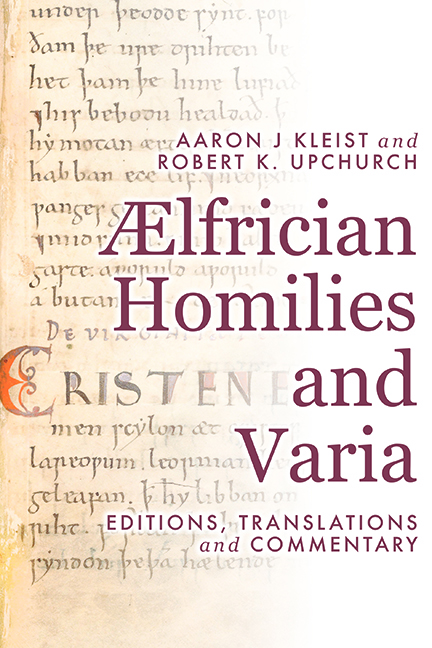Book contents
- Frontmatter
- Contents
- Preface
- Acknowledgements
- Abbreviations
- Sigla for Cited Ælfrician Manuscripts
- Dates for Cited Ælfrician Works
- Editorial Conventions
- Conventions Used in the Commentaries
- Homilies The Proper of the Season
- Homilies The Proper of the Saints
- Ælfrician Homilies and Varia: Editions, Translations, and Commentary: Volume II
- Homilies The Common of the Saints
- Homilies Unspecified Occasions
- Varia
- Works Cited
- Index
- ANGLO-SAXON TEXTS
24 - Pater noster (‘The Lord’s Prayer’)
Published online by Cambridge University Press: 05 March 2024
- Frontmatter
- Contents
- Preface
- Acknowledgements
- Abbreviations
- Sigla for Cited Ælfrician Manuscripts
- Dates for Cited Ælfrician Works
- Editorial Conventions
- Conventions Used in the Commentaries
- Homilies The Proper of the Season
- Homilies The Proper of the Saints
- Ælfrician Homilies and Varia: Editions, Translations, and Commentary: Volume II
- Homilies The Common of the Saints
- Homilies Unspecified Occasions
- Varia
- Works Cited
- Index
- ANGLO-SAXON TEXTS
Summary
For Ælfric, the Paternoster is one of the two texts most necessary for Christians to know. The other, as mentioned in the preceding chapters, is a creed, but whereas a creed is meant to strengthen Christians’ faith by teaching them what to believe, the Lord's Prayer teaches them what to pray for. The short prayer Christ taught his disciples encapsulates, in Ælfric's words, ‘all our needs both spiritual and physical’, and is thus useful ‘for all people who are Christians throughout all time’. As was the case with a creed, he expects Anglo-Saxon priests to teach the laity the Lord's Prayer and to teach them about it as well. To those ends, he includes De dominica oratione (‘Concerning the Lord's Prayer’ [CH I.19]) in the First Series of Catholic Homilies to explain the prayer's seven petitions, and several years later he provides the stand-alone translation of the Paternoster edited here. Ælfric bases his translation on the version of the Lord's Prayer in Matthew's Gospel (Matthew 6.9–13) but freely mingles details from that in Luke's (Luke 11.2–4). He adds the Old English equivalent of ‘Amen’ to the end of the prayer as we would expect. And perhaps with a view toward making the text easy to understand and memorize, he has petitioners ask God to forgive us our sins, not as we forgive our ‘debtors’ but as we forgive ‘those who sin against us’. Once memorized, the Paternoster could be, according to Ælfric, recited in prayer, chanted in church, and sung with a creed while on a journey.
Ælfric's version was one among multiple prose translations of the Paternoster that circulated in Anglo-Saxon England, but as was the case with his creeds, his Pater noster is singular for being a stand-alone catechetical text. Most of the prose versions exist as glosses to Latin texts of the Lord's Prayer found in psalters and Gospel books. Vernacular renderings also appear in the Old English versions of the Gospels where we would expect to find them. Archbishop Wulfstan translates the Paternoster in a brief catechetical homily along with the Creed, and Ælfric renders the prayer in Old English twice in De dominica oratione.
- Type
- Chapter
- Information
- Ælfrician Homilies and VariaEditions, Translations, and Commentary, pp. 965 - 976Publisher: Boydell & BrewerPrint publication year: 2022



